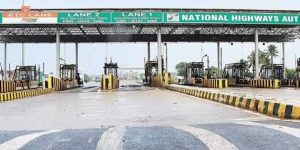
India has informed the World Bank about its significant achievements in reducing wait times at toll plazas and expediting export releases at land ports. Thanks to FASTag, the average wait time at toll plazas has dropped dramatically from 714 seconds to just 47 seconds.
India significantly reduced export release time at land ports, cutting it from 101 hours in 2021 to just 22 hours in 2022. This underscores India’s commitment to enhancing logistics efficiency. In a recent meeting with World Bank officials, the Indian government outlined its plans to bolster the country’s infrastructure. One major initiative involves adding 30,000 km of new railway tracks by FY31 to expand the railway network and enhance connectivity.
Furthermore, India aims to increase its port capacity to 2,200 million tonnes per annum (mtpa) by 2030, up from 1,617 mtpa in the previous year. The national highways network is also set to expand to 185,000 km by 2030, with 75,000 km designed as four-lane and above.
The Department for Promotion of Industry and Internal Trade, under the goal of propelling India into the top 25 countries in the World Bank Logistics Performance Index (LPI), led the meeting. Sumita Dawra, special secretary (logistics) at DPIIT, explained, “We have showcased initiatives in logistics and infra sectors to the World Bank team, and also next-gen reforms in areas such as rail, road, multimodal shifts, EXIM, customs, green logistics.”
India’s focus on logistics has yielded positive results, with its LPI ranking improving by six places to 38 out of 139 countries in 2023. This progress underscores India’s commitment to enhancing logistics capabilities and facilitating smoother trade and transportation.
The railway ministry aims to lay an additional 80,000 km of rail tracks in the next 25 years and increase rail containerization to 35% by 2031. During the meeting, Dawra discussed various interventions and initiatives, including integrated logistics parks, digitized systems for freight data analytics, and simplification of processes, all geared toward improving efficiency and streamlining logistics operations in the country.
India is actively working on implementing a land port management system by June next year. This system will aid in tracking consignments, mechanizing cargo handling, and facilitating competitively priced shipments. The Land Ports Authority of India is also in the process of developing 26 new land ports over the next five years, further enhancing India’s logistics infrastructure.
